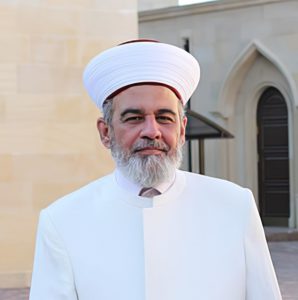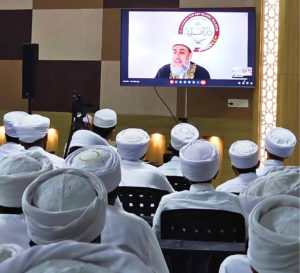Al-Bayhaqiyy said in his book Al-Qadar when mentioning the evidence for this case that everything the slave does from good or evil is by Allāh’s Will and Creating. He mentions that some people mentioned to Lady ^Aa’ishah “you went out to Basrah” and so she said this was destiny. She regretted what she did which is that she was present on the side of the army that was fighting against the leader of the believers ^Aliyy Ibn Abī Tālib. She regretted it deeply and severely to the extent that she used to cry from that until her khimār would get wet. The khimār is that which the female puts on her head to cover it and makes it go down over her neck.
Her khimār would get wet from how severely she would weep whenever she remembered that incident when she went out to Basrah and she was present with the army that was opposing ^Aliyy. She said that incident occurred from her because it was destiny. That means that Allāh willed for that occur and created it. She did not say “this is what I have created among my deeds” just as the Qadariyyah mu^tazilah say rather she said this was destiny, that is, Allāh willed for that to happen.
If the person refers to destiny when talking about a sin that they have repented from then we do not object to that. However if the person is still presently engaged in the sin then he is not allowed to supposedly defend himself by saying “Allāh willed for me.”
He is obligated to repent right away and then afterwards he may say that was destiny. As for the one who tries to use destiny as a supposed defense for his actions while he is presently engaged in the sin then that is a dispraised matter, even if it was his belief that was destiny because the creed of the muslim is that everything that the human does whether good or evil is according to Allāh’s Will. However, the person cannot supposedly defend himself while presently engaging in a sin by saying that it is destiny because that would mean it is as if he is saying “I am not to blame because it is destiny.” True it is destined by Allāh to occur but the slave is not allowed to commit the sin and then supposedly defend himself while he is presently committing the sin. However, after repentance, if he says that then it would not be dispraised from him. Lady ^Ā’ishah may Allāh raise her rank, after she repented from that outing which was her going out from Makkah to Iraq, she said that. As for her going out to Makkah when ^Uthmān was assassinated, right after ^Uthmān was assassinated, she left from Madīnah to Makkah with the intention of performing the Hajj then in Makkah some people who wanted to manifest their zeal to avenge the murder of ^Uthmān said to her: “Come with us in hopes that with your presence the conflict will be resolved. She listened to them and she headed towards Basrah then while she was on the way there something happened with her that reminded her of the Hadeeth of the Prophet peace be upon that he has said to his wives and ^Ā’ishah was among them. He said to them words that mean who among you will be riding the camel that is Adbab and the dogs of haw’ab bark at her. narrated by Ahmad.
Then, when she arrived to Iraq to a place where there was water, she heard the barking of dogs and so she asked the name of this place and it was told to her it is called Haw’ab and so she remembered what the Prophet peace be upon him said and so she became bothered and her mind was not at ease and they insisted telling her “come with us and perhaps by your presence the conflict among the muslims will be resolved.” They kept insisting and it was willed by Allāh.
She went along with them and she was not comfortable with that. Then, when she reached the camp of those fighting against ^Aliyy, she stayed in that camp instead of going to ^Aliyy and reminding him, that was her sin, that is what she was referring to when she said “It was destiny.”
In the continuation of the Hadeeth of the Prophet peace be upon him he said to her “see to it that it wont be you,” however, nothing prevents what Allāh willed. Whatever Allāh willed to be shall surely be. Despite that she remembered the Hadeeth and her discomfort from that she continued her journey until she reached that place, the enemy camp and she remained there and she did not go to ^Aliyy, may Allāh raise his rank.
The adbab camel means the camel with a lot of hair and the camel that was presented to ^Ā’ishah when she headed from Makkah to Basrah was of this description. It had plenty of hair in its neck. it is said about the camel if it had a lot of hair on its neck Adabb, but the reason Al-adbab was said was so that it could align phonetically with the term Al-haw’ab
Lady ^Ā’ishah may Allāh accept her deeds did not defend herself and say it was my ijtihād that I did that and therefore i have reward. She did not say how some people say.
Some people say: “Whoever was a companion of the messenger of Allāh then his action is not rejected regardless of what it is” this is wrong. ^Ā’ishah said that incident occurred because Allāh willed for it to occur, she did not add to that, she did not say: “I made ijtihād I have reward for it.”





